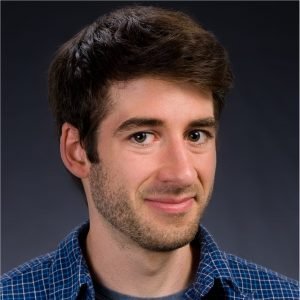Nanotechnology at Northwestern
Meet Joseph Muldoon, a PhD student in the Leonard Lab and Bagheri Lab
May 08, 2020
Joseph Muldoon is a doctoral student in Prof. Joshua Leonard’s lab, which focuses on cellular devices and biomolecular engineering, and Prof. Neda Bagheri’s lab, which focuses on modeling dynamic life systems.
 Where are you originally from?
Where are you originally from?
Fairfax, Virginia.
Where did you complete your undergraduate degree?
The University of Virginia.
What year are you now?
I’m a 7th year in the Interdisciplinary Biological Sciences (IBiS) program.
When did you first become interested in engineering, and what are your research interests?
I studied biology and chemistry in college, and through several research projects realized that I really needed an additional set of skills to solve the problems I was working on. I was facing topics that, as I began to realize, could be more systematically and satisfyingly addressed by integrating quantitative approaches such as from bioinformatics and modeling. The field of synthetic biology was also taking off at that time, and I was taken with the elegance of distilling complex phenomena to comprehensible building blocks (genetic parts) and the creativity and promise behind efforts to engineer interesting and useful things. I decided to pursue synthetic biology and computational biology in graduate school.
How do you explain what you study to non-scientists?
I am studying ways to genetically engineer new functions, particularly in mammalian cells. It is an exciting time, in that we have the capability to reprogram cells at the level of their DNA to sense cues, process information, and respond with user-specified behaviors. This type of technology is finding applications in fundamental research and in the targeted treatment of diseases. Since many of the genetic parts for designing cellular functions are nascent, I am developing quantitative approaches to characterize how these parts operate and how they can be linked together predictively and precisely.
You’re part of an ambitious effort to develop a one-step diagnostic tool that could be used to detect the COVID-19 virus. What drew you to this project? Which aspect are you working on, and how does that fit into the big picture?
Going into the spring of 2020, I was looking to wrap up graduate school and defend my thesis. Once the pandemic hit, the most immediate priorities shifted. I’m glad to be a part of a group working to develop effective diagnostic tests for SARS-CoV-2, which are very much needed, and which in the long-term could also be repurposed to detect other pathogens. I am on the computational modeling team, which is conducting predictive simulations to characterize and improve the performance of the biochemical circuits underlying the diagnostic tests, and I am collaborating with experimental teams on the molecular design of these circuits.
What has been a highlight of your time at Northwestern?
A few years ago, with encouragement from my advisors, I started mentoring undergraduate and master’s students. Over time, the group grew to include many people, each specializing in different experimental and computational approaches. Most have graduated and are now on to next steps in their scientific or medical careers. Each day, what makes lab exciting, in addition to pursuing the science itself, is the opportunity to work with a team of dedicated people.
What has been the most challenging aspect of your work or your time here?
It’s often the case, starting out in a new area and trying to establish a research framework, that it takes time to build momentum. It’s really fulfilling when you start to arrive at tangible wins.
Can you tell me about a mentor who has helped you in your career?
A number of the Center for Synthetic Biology (CSB) students and faculty have been mentors, in the sense that I’ve been able to observe how they navigate a variety of scientific and professional issues.
What are your hobbies outside of the lab?
I play clarinet in Philharmonia, one of the campus orchestras. I also love to run—it helps keep me energized and focused, and the lakefront trail is beautiful.